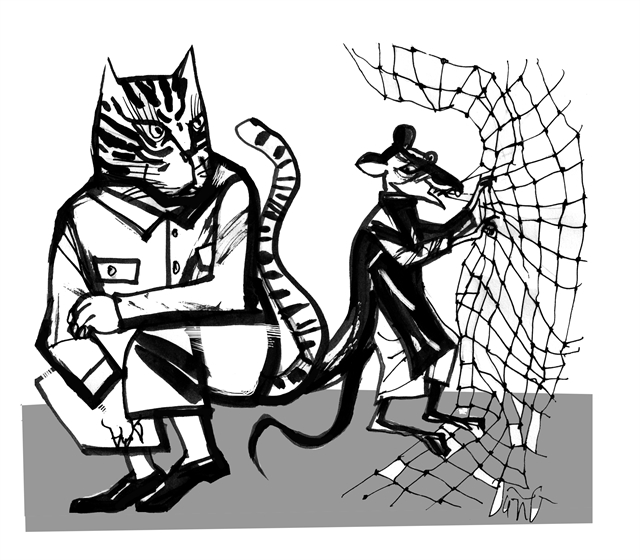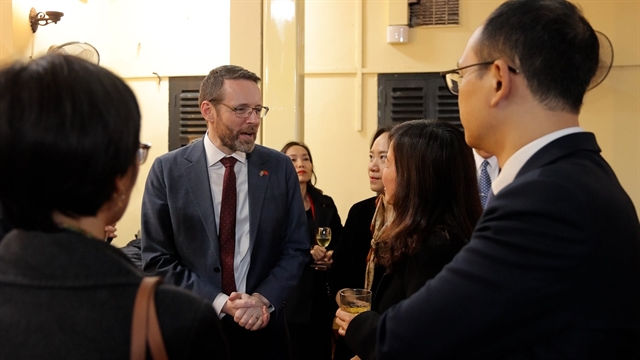

 |
| Illustration by Đỗ Dũng |
Dear Your Honour Mr. Prime Minister,
We have received your Lunar New Year Greetings letter in which you invite us, on the occasion of the new year, to fly over to your honourable country to swear a blood oath to ally our two countries for eternity. We are really anxious to accept your invitation. However, according to our customs, the lunar January is the month of buoyant festivities in which we can drink for sure, but it’s taboo to swear blood.
Still, in the meantime, we can exchange letters to discuss various aspects of swearing, so that we can drink each other’s blood without harming our guts. For this worthy purpose, I will take the liberty to tell you a couple of ancient fables, which may also lighten your mood during these three days of Tết [Lunar New Year holiday].
Dear Mr. Prime Minister, in the old days, in our country, every village had a banyan tree. In my home village, old people say there used to be a lone banyan tree shooting up on the outskirts of the forest. It was a gigantic, towering tree with dense green foliage that sheltered animals and birds from rain and shine. At the foot of the tree with thickly interlacing roots, there lived a mouse that could dig soil with talented skills, creating hundreds of interconnecting tunnels like in Củ Chi (1) to flee in and out with ease, defying any chaser. Intriguingly, where there are mice, there appear cats, their bond unbreakable. Thus, forthwith to the banyan tree, a wild cat migrated, finding abundant prey in the birds, which often came and perched on surrounding branches.
Discovering so many animals and birds gathering in one fertile spot, a hunter started to come. His job was simple but deadly effective: put a trap at the foot of the tree, go home to sleep, then in the morning after, return to harvest a plenitude of foxes, rabbits, porcupines, and so forth. One day, the hunter felt inspired to roast a piece of fragrant fatty meat as bait. The cat, which was drowsing on the tree, couldn’t resist and crawled down. What should happen happened: the trap banged shut, catching the poor carnivore. It struggled to escape for a while, then lay down in defeat.
Hiding deep within its tunnels when the cat jumped down, the mouse sneaked out to take a look and felt triumphant to find its enemy lying shrunken, desperate. The mouse jumped out of its cave and immediately wielded its right to free movement, which had been previously curtailed by the cat. Yet its nose seemed ready to melt into water, as it inhaled the buttery fragrance that kept exuding nonchalantly beside the trap. In the history of the rodent species, has there been any record of a heroic mouse that managed to feast carefreely in front of a cat? The mouse wondered and decided to turn a new page! It got down to a royal feast which, unfortunately, lasted no longer than one meow of the cat nearby. The mouse startled, looked up, felt stung to its core: a snake was sliding forward with sparkling eyes and a flicking tongue. The mouse was about to flee when all of a sudden, something whizzed down. A neighbouring owl had darted headlong from a perching place. Its beak looked like a scythe; its face looked as wicked as a witch’s. The mouse was thrown between a rock and a hard place. Where should it run?
Dear Mr. Prime Minister, where to run? Among all the "thirty-six stratagems” (3), as our saying goes, what would work better for the mouse than to run into the trap? Into the lap of the cat? Cats are mice’s enemies, but at that critical moment, only the mouse had the ability to bite off the latticed trap to save the imprisoned cat and become a cat saviour. Cats and mice are eternal foes, but at one critical moment, a cat fell into a trap and suddenly became a friendly cat.
Life, as we all know, is impermanent. In one instant, foes turn into friends, depending on the situation. Depending on the situation, rivalry or alliance forms, and disintegrates. Allies don’t love, merely need each other, or as we say, when times change, you change.
Dear Mr. Prime Minister, this is what the mouse thought. So, it said diplomatically to the cat, “Dear Uncle Cat, seeing you lying down so shrunken pains me so. What has befallen you, such a great one! I’ll run over there to bite off the lattice for you; please don’t harm me, okay?” Without waiting for the cat’s reply, the mice glided headlong into the trap. No sooner did it do so than the snake thrust its neck forward and the owl fanned its wings violently, both ready to kill.
The cat acted with magnanimity and replied sweetly, “Don’t you worry, little brother. As old sages taught us, it’s better to befriend a smart enemy than a stupid friend. That’s not to mention we’re no longer enemies. We’re allies now. Rest assured and bite off the lattice, little brother.”
By then though, the mouse had seen the situation in a different light. The snake had slunk away, the owl had flown up the tree, those two sources of danger had vanished: the mouse was now face to face with an eternal foe. Obviously, the cat needed the mouse, but the mouse didn’t need the cat anymore, did it? Under the paws of the cat, the mouse was not a friend but a prisoner.
The mouse felt its security threatened to bare bones. Immediately, it re-assessed its saviour’s position. It told the cat, “Uncle Cat, if not for me, you’ll perish here. God has sent me to rescue you. But you don’t need to thank me, just let me bite the lattice. Don’t scare me, because if I’m scared, my mouth will tremble and my teeth won’t bite. So, lie still, Uncle!”
As it uttered these words, the mouse thought strategically, “I only need to bite off two holes in the lattice to create a space just big enough for me to dart out without being snatched back.” The cat also mused, in an equally strategic light, “As long as the holes aren’t big enough for me to get out, I must maintain the highest level of alertness to prevent that chit from fleeing.” Neither side was fooled, but both thought they could outwit the other, so they tried to do just that.
Sensing the cat’s intention, the mouse brought up death to scare off its enemy. It said, “Uncle Cat, though I’m weak and you’re strong, in front of death, we’re equal. At the moment, you and I are being caught up in an extremely equal position, so please move aside a bit so that I can get down to work comfortably.”
The cat refused to move an inch, and was bent on moralizing, “In this situation, we shouldn’t talk about weakness and strength, little brother. As old sages taught us, a friend in need is a friend indeed. Little brother, you’re my truest friend. Old sages also advised, 'return favours with favours, return resentment with favours too.' When I get out of here, I’ll forever remember my debt owed you.”
The mouse groped its way through a lengthy reply, “Old sages advised one way, people act the opposite way, dear Uncle!. Old sages advised, ‘a gentleman honours his words', but people say, ‘a gentleman who honours his words is stupid, a gentleman who acts contrarily to his words is wise.’ No one keeps a promise that harms themselves. If you keep your promise when situations change, you’ll be called stupid. Strong people never lack opportunities to break promises, do they? Those people only pretend to act virtuously to fool the naive. What’s governance, dear uncle, but pretension? One excels at pretending, hiding one’s true face at the deepest bottom. Take you at the moment, for instance. When you’re lying quietly with half-closed eyes, you look as benign as a praying nun. Anybody who saw you now would want to forge an eternal alliance with you.”
The cat shook its head and said, “We have to trust each other in life, little brother! Without trust, there would be no society or community. I swear, by the god of the banyan tree, when I get out of here, I’ll change my karma, consider mice my friends, and mice’s enemies my own, and ally myself with you forever.”
In response, the mouse ranted on, because ranting was its strategy. It had to distract the cat, whose ability to concentrate while catching mice had been perfected to impeccability. In order to flee, the mouse must turn the cat’s attention elsewhere. So, it said with a sweet voice, “Dear Uncle Cat! seeing you lying with half-closed eyes, I recall my paternal grandmother who used to lie down in the same manner whenever she told folk tales to me. There was a great one which I remember very well. Do you want to hear it? I can tell it to you. Just lie down, relax and close your eyes. Yeah, good, I’ll be starting now. Once upon a time…”
Dear Mr. Prime Minister, so the cat half-closed its eyes to listen to a folk story. The forest went quiet, the breezes swung the branches, the cicadas gave forth a symphony. It was usually the comfiest hour for the cat to fall asleep on the banyan tree. Its sleep felt all the more pleasant thanks to the mouse’s sweet, caressing voice.
***
“Once upon a time, there was a stork living upon a lake, which wasn’t so big but it didn’t lack fish. The stork had a leisurely life, curling one leg up to relax all day long, only putting both legs down in the water when it felt hungry to slowly catch a few fish or shrimps here and there. Days and months passed and the stork turned old… It could still stand on one leg, but couldn’t catch fish as sharply as before.
To survive, the stork soothed its hungry stomach by catching dragonflies and grasshoppers buzzing lowly in the grass. One day, out of boredom, a huge crab crawled up to land and saw the stork standing forlornly. The crab took pity and inquired, “Sister Stork, what is bothering you to the point of standing on one leg contemplating passing clouds so moodily?”
As the old sages taught, necessity knows no law. The stork put on a morose air and replied, “I’m in a dire strait; starvation is upon my heels. As I stood here the other day, I heard two fishermen discuss a future plan to empty this lake to catch all the fish. If there’s no fish, there’ll be no crabs or storks. Without fish, what’ll there be for me to feed upon?”
The crab turned pale, its moss-green shell blanching instantly. It had been crawling horizontally, but suddenly started to crawl vertically in order to reach the water faster to alert the fish community about that imminent danger. The fish council convened, then dispatched two delegates to meet the stork to discuss solutions to protect communal security. The two delegates said, “Dear Sister Stork, though you’re our enemy, we’re both sharing the same fate now. So please tell us a stratagem to escape together.”
The stork pretended to bristle, “We aren’t enemies now! The situation is forcing us to become allies. However, allies must trust each other and swear to stand by each other till death do us part. If we suspect each other, we’ll die. Are you going to swear?”
The two delegates waved their tails convulsively and shouted, “We swear! We swear!” The stork said leisurely, “Over there, behind the hills, there’s a lake with clean and clear water. My ancestors have taught us that even if we perish, we should perish in clean, clear, honourable waters (3). That’s the lake I’ve reserved for my last breath. Now, because of our current crisis, I have decided to donate it to you. Starting from tomorrow morning, we’ll embark on a mass migration plan. I’ll take turns to fly each one of you on my back to drop at the lake. Remember to bite on my feathers tightly to avoid falling during flight.”
The two delegates were overjoyed, and thanked the stork profusely. The stork replied nonchalantly, “You don’t have to thank me! It’s just an ally's duty. See you tomorrow morning.”
Back at the fish convention, after listening to the two delegates report back, the council felt glad and relieved, and immediately announced the great mass migration plan. Who would go first? Of course, the leaders should. Border-crossing is the same for fish as for humans because survival instincts are universal. Thus, the chair of the fish council volunteered to be a role model.
“Chairman, please jump on my back,” said the stork as it curled both legs to receive the chair, a chubby rabbitfish. As the stork uttered these words, drool trickled down its beak. As the sister-brother pair flew over the hills, the chair felt dizzy, as the winds scarily zipped by its ears.
The stork repeatedly warned, “Close your eyes, close your eyes! Bite my feathers tight, bite my feathers tight!” After a while, out of curiosity, the chair half-opened his eyes to glance down, only to find rugged rocks beneath. Where was the lake? “Where’s water? Where’s water?” asked the chair. “Here’s water! Here’s water!” replied the stork. As it replied, the stork swung its wings, from left, to right, then gave a shake. The chair lost balance, fell onto a rock and broke its bones to pieces.
The stork flew back to the lake. The first and second deputy chairs, general secretary, head of the judiciary and so on had been queuing up anxiously waiting to volunteer. The stork flew seven round trips in all, sending all fish leaders and assistants to the rocks and hell. At the end of the day, it rewarded itself with a bountiful feast, to make up for all those years when it had to feed on dragonflies and grasshoppers.
This situation lasted for three days, after which the stork regained its maiden youthfulness. Then one day, the crab volunteered. It knew suspicion was harmful to alliance. However, as it had received absolutely no news from the whole of the leaders’ team, it started to feel suspicious. As for the stork, considering that the migration campaign was proceeding exceedingly well, it was utterly essential to get rid of the crab, which was known for its stubborn nature. The crab must be prevented from provoking any contrary discussion among the fish community, which currently lacked leadership.
Thus, the stork graciously welcomed the crab on its back, mustering its strength to carry a heavy weight. As they flew over the rugged rocks, the crab ignored the stork’s repeated caution and stared both eyes widely at the landscape. “Where’s water?’ asked the crab. The stork smirked, “You’re all fools. No wonder God dooms you to the water. Why on earth do you think water folks and sky folks would become allies? You ask for water, here it is!” The stork swung its wings, but wait, was there something tugging at its neck? Kh...kh…, what the hell was clipping its neck? Oh gosh, it was the crab’s claws. First one claw, then came the second claw! With both claws strangling the stork’s neck, the crab demanded, “Fly back to the lake. Fast. And touch down safely!”
No sooner did the stork touch its legs on the ground than the crab tightened its claws and broke the stork’s neck into two pieces.”
***
Dear Mr. Prime Minister, as the half-drowsy cat listened to this tragic ending, it startled up and opened its eyes. Oh my god, the mouse had jumped outside. Now safe in front of the cave, the smaller beast boasted, “Dear Uncle Cat, neither foes nor friends are forever. Situations change from one minute to another; life is impermanent in each and every instant. The weak can show their fists to the strong thanks to changing situations, which makes the strong kneel before the weak. If the weak think the strong are kind, they break their neck one day.”
So, to celebrate springtime, I’ve told you a long story which may hopefully help to whet your appetite for a glass of red wine. Let us drink to your longevity. Long life to you, Mr. Prime Minister.
Translated by Đỗ Linh, edited by Carlos Ottery









